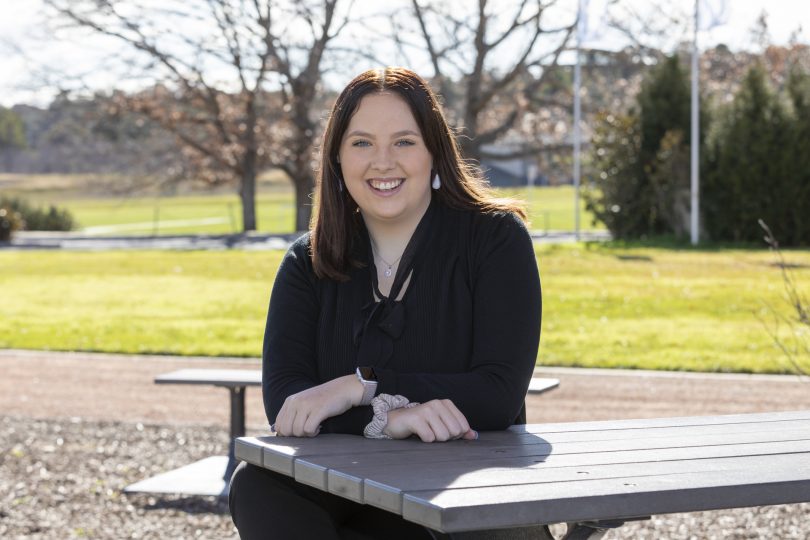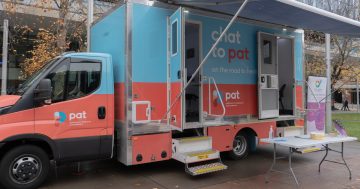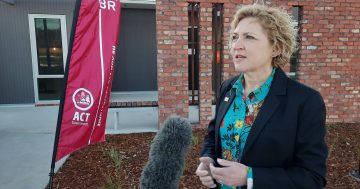
PJ Anderson is forced to drive to Bowral every month to see a female psychiatrist as none are available in the ACT. Photo: Michelle Kroll.
Admitting you need professional help is hard. It is even harder when you’re then put on a year-long waiting list for a psychiatrist you are not even sure you will like.
It’s harder still when that help is a two-and-a-half-hour drive away, and unfortunately, Canberra’s ongoing and serious shortage of mental health professionals in the public system means that is not an uncommon experience.
For one Canberra teenager, this has meant a wait of more than four years before finding a psychologist with whom she felt comfortable enough to share her experiences of childhood trauma.
“I feel like I would not be in the position I am in today if I was able to get the help I needed but, unfortunately, I didn’t and we keep looking and still had no luck,” PJ Anderson said.
“We looked into seeing a psychiatrist, and the closest female psychiatrist was in Bowral. My mum and I had to travel there once a month – two-and-a-half hours – for a half-hour appointment.
“After four years I was able to find a psychologist but they were out in Goulburn and I did not feel a connection with her.”
PJ’s trauma is related to stalking and prevents her from trusting a male psychologist.
“I was 10 years old. I didn’t know everything at 10 years old. I was not going to be like ‘oh, there is something going wrong with me in my head, I need help’”, she said.
A year ago, and more than three years after trying to get in to see a female psychologist, PJ was ready to give up. The constant cycle of admitting to needing professional help, only to be rejected or put on a long waiting list became too much for the teenager to handle.
“I have had enough, getting my hopes up that I could get in to see someone and then being put on a six-month waiting list,” she said.
“I was sick and tired of being shut down every time. It definitely did not help me mentally. It put me in a slump even more. It was already hard enough four years ago moving to Canberra and admitting that I needed help.”
Luckily, her mother helped her stay positive and she was able to get in to see a psychologist in Belconnen two months ago, and almost five years after first reaching out.
“I just needed someone in my life I could sit down with and get everything off my chest, but I did not get the opportunity to do that.”
One reason for the delay was that PJ was trying to access help through the public health system, a system which Mental Health Minister Shane Rattenbury has acknowledged is experiencing a shortage of professional psychologists and psychiatrists.
The ACT Government says it is committed to expanding and growing its mental health workforce, placing a priority on recruiting psychiatrists both nationally and internationally to come to the Territory.
“There is an ongoing national shortage of psychiatrists in public and private mental health services across Australia that contributes to the lower-than-desired number of psychiatrists in the ACT,” a Canberra Health Services spokesperson said.
“This is a nation-wide issue and a significant challenge across jurisdictions.”
Free services like Lifeline and Kids Helpline operate a 24/7 crisis telephone service and also offer help through a variety of messaging platforms. But the services are often inundated – especially throughout the pandemic – and for people like PJ, not being able to see someone face-to-face is a difficult hurdle to tackle.
“I like the human interaction and seeing how they react to what I am saying,” she said.
“It is more personal than over the phone where I do not know what their body language is or what they are thinking.
“When I am sharing such personal things about myself, I did not find that helpful personally.”
Giving evidence at last week’s ACT parliamentary inquiry into youth mental health, the Black Dog Institute called for suicide prevention, mental health prevention and early intervention to form part of the school curriculum. This comes after a report released by the ACT Government earlier this year found half of the ACT’s young people and children say they have problems accessing mental health services and affording mental health services.





















